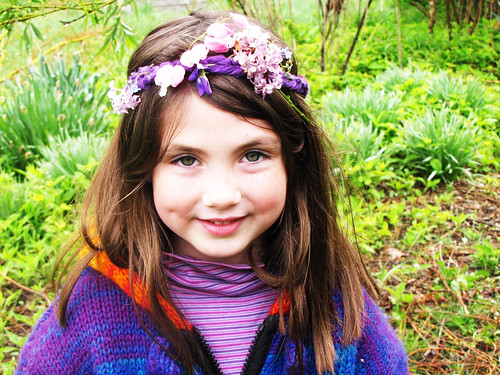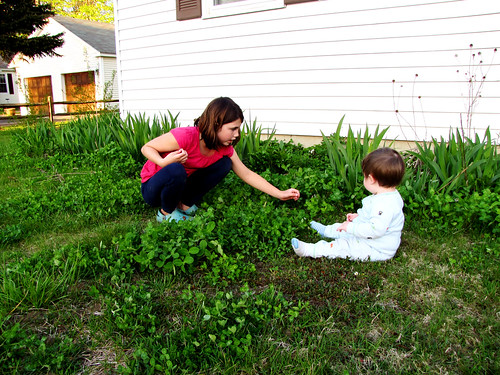Since we have talked on and off about homeschooling for a couple of years now, I have had plenty of time to think about what “philosophy,” if any, we might use to educate our daughter.
While I was, at first, drawn toward Waldorf education, my daughter was (self-taught) reading chapter books by the time she was six. I didn’t see how an educational philosophy that didn’t even begin to teach reading in a formal way until third grade would work for her. But, there are some things I love about Waldorf, like the “real work” and home arts — baking, sewing, knitting, etc — and so I will be using some of them in our program. I also have a lot of books and materials leftover from my daughter’s year at a Waldorf kindergarten, and from a Waldorf-based professional development course that I took several years ago.
Lillia at her Waldorf kindergarten May Day celebration.
I’m also intrigued by something called Place-Based Education, which is a method for teaching children using the local environment as a classroom. We have a conservation area right behind our house, which consists of a pond and miles and miles of hiking trails. I can’t wait to implement some of the Place-Based Education activities using our own yard, and extended spaces beyond it.
My kiddos engaged in unintentional Place-Based Education.
Most recently, I came across the work of Charlotte Mason, and I fell in love! Using literature to teach core subjects? Genius! I think this approach will work especially well for our daughter, who is a very advanced reader. I’m also looking forward to helping her improve her handwriting with “copywork.” I found a link to this site that allows you to create your own copywork sheets using print or cursive handwriting. I already made our whole three week’s worth, and it only took me about 20 minutes or so this afternoon. I’m also definitely going to do nature journaling with Lillia, which kind of goes hand in hand with the Place-Based Education, if you ask me.
I try to do what I can to avoid being dogmatic, about anything in life, really. That was one of the reasons why we left the Waldorf school system. I had questions, and I felt it was frowned-upon to ask questions. We were just supposed to accept what Rudolf Steiner said as law. Personally, I want the freedom to choose what feels right, using my intuition and my intellect as a guide. I would love to hear from anyone who uses any of these methods, or who has created a hodge-podge of theories.


